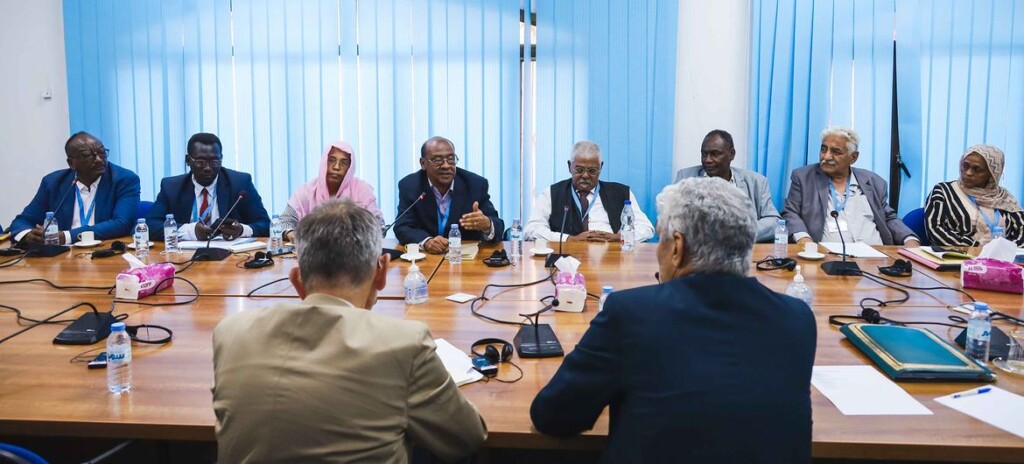Eastern Sudan issue stalls Trilateral Mechanism dialogue
Talks being facilitated by the AU-IGAD-UNITAMS Trilateral Mechanism between the Forces for Freedom and Change-Central Council (FFC-CC) alliance and the ruling military are being pushed towards a settlement despite disagreement over the Mechanism’s involvement in eastern Sudan issues.
 AU-IGAD-UN Trilateral Mechanism meeting in Khartoum (File photo: UN)
AU-IGAD-UN Trilateral Mechanism meeting in Khartoum (File photo: UN)
Talks being facilitated by the AU-IGAD-UNITAMS Trilateral Mechanism between the Forces for Freedom and Change-Central Council (FFC-CC) alliance and the ruling military are being pushed towards a settlement despite disagreement over the Mechanism’s involvement in eastern Sudan issues.
The Trilateral Mechanism said that it is seeking a settlement “acceptable to a sufficient number of Sudanese,” and not the absolute majority, to guarantee its sustainability.
On Thursday, at the end of his visit to Kassala in eastern Sudan, African Union (AU) Ambassador and spokesperson for the Trilateral Mechanism, Mohamed Belaiche, called on the Sudanese to accept the current settlement. “The main guarantor will be the Sudanese themselves,” he said, explaining that the role of the Trilateral Mechanism in negotiations is only to support and facilitate.
During Belaiche’s visit to Kassala, accompanied by a Mechanism delegation, they dealt with the current political process and the road map to address the issues of eastern Sudan. The delegation listened to the demands of various civil society and governmental bodies in Kassala related to development, power and wealth sharing, and the current negotiations between the military junta and the FFC-CC.
Eastern Sudan protocol
The negotiations include a review of the Juba Peace Agreement, including its Eastern Sudan Track Protocol, widely contested in the region itself. The High Council of Beja Nazirs and Independent Chieftains, chaired by Nazir Sayed Tirik, have previously demanded the cancellation of the Eastern Sudan Track, as agreed on in the 2020 Juba Peace Agreement and the formation of a ‘government of technocrats’ as stipulated in the Constitutional Document.
Following Belaiche’s visit, Tirik condemned the proposal for the Trilateral Mechanism to participate in the dialogue over a new settlement in order “to solve the eastern Sudan crisis,” in a press statement on Friday.
He explained that they have already rejected any bilateral agreement or creation of a single document out of the dialogue, suggesting merging the initiatives presented in the region.
Political activist Hamrour Hussein welcomed the Mechanism’s visit to Kassala. He told Radio Dabanga that the visit aims to ensure that eastern Sudan issues do not impede the transition to civilian rule in Sudan.
He explained that the conflicts in eastern Sudan between the various tribes and political components continue to hamper political transformation in the region and have led to the current stalemate. He said that affiliates of the defunct regime are still in control in Kassala.
Beja Nazirs Council
The Beja Nazirs Council has opposed the Eastern Sudan Track since it was first agreed upon during the peace negotiations between the Sudanese government and the Sudan Revolutionary Front rebel alliance in the South Sudan capital of Juba in February 2020. The track was negotiated by the Beja Congress in Opposition and the United Popular Front for Liberation and Justice. The Beja Nazirs Council was not involved in the talks.
The Beja leaders’ council reacted at the time by calling for an inclusive eastern Sudan conference to decide on the future of the region. They organised two large protest events two years ago, in Sinkat in Red Sea state and in Telkok in Kassala, where they threatened they would take the right to self-determination for eastern Sudan if the government would not comply with their demands.
In September, the Beja Nazirs Council announced larger protest actions to put more pressure on the Sudanese government to cancel the Eastern Sudan Track protocol. In a visit of a high-level government delegation from Khartoum, chaired by Sovereignty Council member Gen Shamseldin Kabashi, at the end of that month, it was agreed to continue negotiations soon. The delegation proposed to hold “a comprehensive conference on eastern Sudan, the results of which would be binding for the government and the rest of the parties”.











 and then
and then